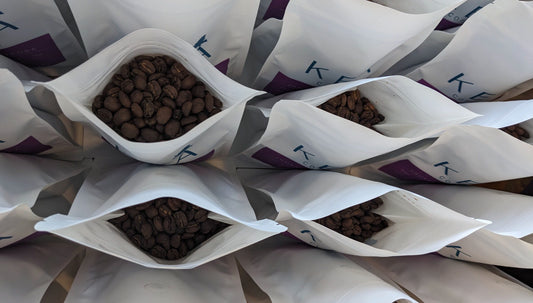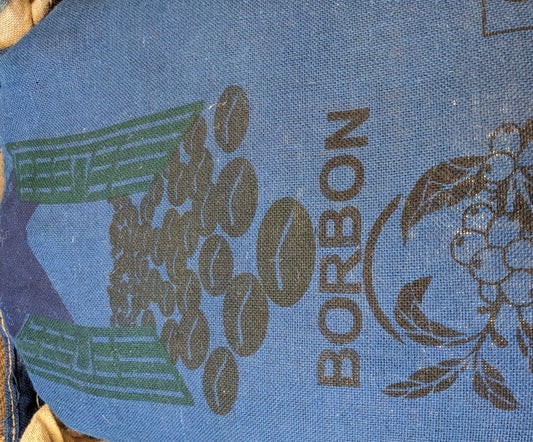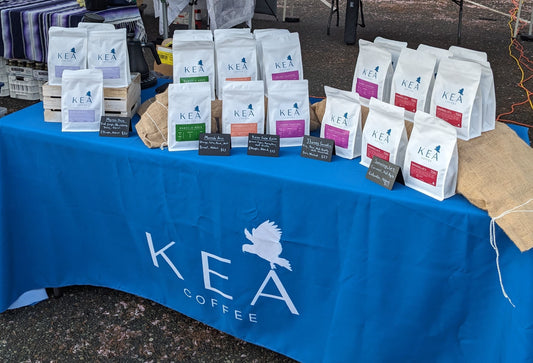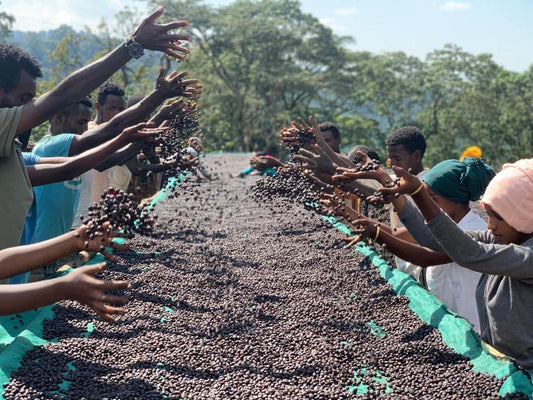If you've had a poke around our website already, you'll know that we're all about fresh, bright, seasonal coffees that shine.
Coffee that lets its true origin characteristics do the talking.
That could be chocolatey and nutty Central Americans, fruity and acidity forward Africans, or wild and wacky tropical fruit and jolly rancher double anaerobic fermentation low oxygen carbon maceration third cousin from the left .... anyway ... you get the idea.
The point is, we love coffees that put their origin, varietal and careful processing on centre stage.
In order to do that, freshness is really important.
So much so, that it's integrated into all aspects of what we do... from sourcing new in season coffees, to roasting to order.
We're extremely proud of the coffees we produce, and the hard work that our farm partners put into growing and improving their lots, and we want you to be able to experience and enjoy that every time you open up a new bag of Kea Coffee.
One question we get often is "why don't you sell your coffee already ground?".
So today, we're going to take a closer look at what happens when you grind coffee, and the role that freshly ground coffee plays in brewing a great cup.
What happens to coffee after it's ground?
We could go deeeep down the rabbit hole on some very nerdy coffee science here, but essentially there's two important things that start to happen as soon as you grind coffee beans.
1. Oxidization increases
Roasted coffee contains over 850 organic compounds that all contribute to aroma, flavour and what you taste in your cup.
A lot of these organic compounds are very volatile.
Volatile Organic Compounds (VOC's) are important for 2 reasons:
- They are responsible for that great aroma you smell when you open a bag of beans or start to brew. And remember, smell is a vitally important part of how we experience flavour.
- They also interact with other compounds in the coffee beans, which helps to add complexity to flavour.
These VOCs are delicate and, as the name kind of implies, volatile.
When they are exposed to the air, they oxidize rapidly.
According to one 2003 study "Volatile constituents are trapped inside the pore structure of the roasted coffee bean and rapidly released when coffee is ground because of the greater surface area for off-gassing" - source.
When we grind coffee, we increase the surface of the area that's exposed to the air.
Great news for extraction.
Bad news for freshness.
With more surface area exposed, oxidization increases and those all important VOCs are depleted much more quickly.
2. CO2 off gassing increases
The roasting process causes a number of chemical reactions to take place inside the bean, and carbon dioxide (CO2) is a biproduct of some of those reactions.
As we talked about above, when we grind coffee, we increase the surface area of the bean that's exposed.
This increase causes CO2 to be lost into the atmosphere much faster.
Too much of that CO2 retained in the coffee beans can get in the way of higher extractions, which is why we recommend waiting for 4-7 days after roasting before brewing up our lighter roasts (but more on that another day). It's also why the bloom phase exists in a good pourover recipe.
But too little CO2 can be far worse.
When it comes time to brew, that carbon dioxide actually helps to dissolve some of the soluble compounds that we want to get out of the bean and into our cups.
So loosing too much of the CO2 before we brew, will reduce the amount of good stuff you're likely able to extract and get into your cup.
To see this in action, check out this video from Mark at Whole Latte Love, where he brewed freshly ground espresso along side a shot of the exact same beans ground 2 days ago:
So, how long does coffee last after it's ground?
The short answer here is, not very long.
It depends a little on how fine your grinding and what your brew method is. Grab a bag of whole bean specialty coffee and test it out. You'll probably be able to notice a difference within hours rather than days in a side by side tasting.
Ground coffee isn't going to go "bad" any time soon. After all, most supermarkets sell coffee that's been ground weeks or months ago.
But if you want to experience great coffee at its peak, grinding fresh right before you brew is really important.
Are there other benefits to freshly ground coffee?
Yes!
Grinding your coffee fresh also means you'll be able to play around with your grind size.
When it comes to dialling in an extraction, being able to experiment with small changes in grind size can have a huge effect on the kind of cups you're able to produce.
But that's a whole other topic for another day...





